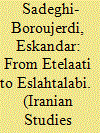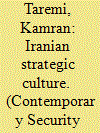| Srl | Item |
| 1 |
ID:
161161


|
|
|
|
|
| Summary/Abstract |
This article is a critical examination of a post-revolutionary Iranian discourse on secularism. This discourse seeks to offer a new understanding of Islam and reformulate its relationship with politics. Intellectuals who were important figures within the post-revolutionary establishment articulated this discourse. ‘Abdolkarim Soroush has been the leading voice of this discourse. Soroush’s project is an attempt to penetrate the individual Muslim’s self-perception through reinterpretation of the nature and role of religion. This article argues that Soroush’s modernist project is a defense of conventional secularism and does not address the challenge of continuity.
|
|
|
|
|
|
|
|
|
|
|
|
|
|
|
|
| 2 |
ID:
134822


|
|
|
|
|
| Summary/Abstract |
This article examines the importance of the political thought and praxis of politico, ‘reformist’ strategist and intellectual, Saʿid Hajjarian, and his rethinking of the post-revolutionary Iranian state’s sources and bases of legitimacy in the 1990s and 2000s. It also provides an exposition and assessment of a number of his recommendations for the realisation of ‘political development’ (towseʿeh-ye siyāsi) in the post-revolutionary order and their contribution to the discourse of eslāhāt during the presidency of Hojjat al-Islam Mohammad Khatami (1997–2005). Moreover, it attempts to situate Hajjarian within a broader spectrum of reformist political opinion and its proponents within the Islamic Republic of Iran’s political class.
|
|
|
|
|
|
|
|
|
|
|
|
|
|
|
|
| 3 |
ID:
129667


|
|
|
|
|
| Publication |
2014.
|
| Summary/Abstract |
This article attempts to deepen our understanding of how state ideology, as a component of strategic culture, influences the manner in which states approach the use of violence. In that context, it examines the influence of Shiite Islam on the way that post-revolutionary Iran has employed force in its own defence. It argues that the influence of religion on Iranian strategic culture has been extensive. Islam has largely shaped the regime's perceptions of international relations, as well as how Iran should relate to the outside world. It has resulted in a highly revisionist foreign policy which attempts to remake the world in its own image. This orientation has left Iran internationally isolated and driven it to rely as far as possible on its own resources for its defence. It has also inclined Iran to forge closer relations with Islamic movements in the Middle East to compensate for the lack of allies among states. Islam has also prompted the regime to adopt deterrence by denial as the cornerstone of its military strategy. This military strategy renounces the use of force for material gain and condones it only when employed for the defence of the homeland and the wider Muslim community. However, it is still willing to strike pre-emptively if need be and take the fight to the enemy should Iran be attacked. Islam has also led Iran to emphasize faith and fighting spirit, over numbers and technology as the determining factors in war because it perceives victory as a divine gift bestowed on those who fight for Allah.
|
|
|
|
|
|
|
|
|
|
|
|
|
|
|
|